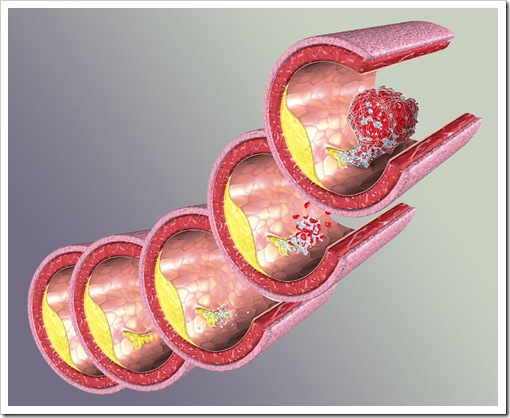摘要:早在19世纪中期,一个叫Armand Trousseau的法国医生就发现癌症和血栓之间有一定的联系,经常出现的血凝块是很危险的,可以导致静脉阻塞。今天我们已经知道,癌症及其治疗会改变血流量的特性,从而有利于形成血凝块。然而,血液凝结不只是发生血栓之后的的副作用和患有癌症后的结果,反之,增加血液的凝固趋势也可能伴随着更高的患得癌症的几率。

血栓形成图
About twelve different blood proteins called clotting factors interact in a coordinated manner in the blood clotting (coagulation) process. In the same way as hemophilia (decreased blood clotting) is inherited, genes also play a role in an increased clotting tendency (thrombophilia): There are well studied gene variants (polymorphisms) of a number of clotting factors which are associated with an increased or decreased clotting tendency. Between two and five percent of the population carry such genetic variants.
At the German Cancer Research Center (Deutsches Krebsforschungszentrum, DKFZ) in Heidelberg, scientists headed by Professor Dr. Hermann Brenner have been studying six gene variants of different clotting factors for a possible connection with colorectal cancer risk. In a large study, they analyzed the occurrence of these six variants in approximately 1.800 colorectal cancer patients and in the same number of healthy control persons.
The team found the most obvious connection for a variant that substantially increases the risk of thrombosis and which is known as factor V Leiden (FVL). Study participants who carry this genetic variant on both copies of their chromosome 1 were found to have a six fold increase in colorectal cancer risk compared to participants who carry two copies of the "standard variant" of factor V. If only one copy of chromosome 1 had the FVL variant, bowel cancer risk was not elevated.
Another connection with bowel cancer prevalence was found by the research team for a particular gene variant of clotting factor XIII: People with this mutation are slightly more rarely affected by venous thrombosis than those who carry the factor XIII standard version. Now the DKFZ team has shown that their colorectal cancer risk is also 15 percent lower. For the other four gene variants studied the team found no connection with bowel cancer risk.
It is known today that coagulation and carcinogenesis are associated. Thus, the interplay of all coagulation (clotting) factors leads to the formation of active thrombin, which, in turn, activates hemostatic fibrin. However, thrombin also contributes to the formation of new blood vessels and is able to dissolve the extracellular matrix, which is the adhesive that keeps cells together. Thrombin may thus make it easier for cancer cells to invade surrounding tissue.
"It is interesting that not every gene variant that increases the tendency to clot automatically also increases the risk of developing colorectal cancer. It also makes a difference whether the gene variant is present on both chromosomes or just on one of them. We therefore have to analyze in detail which clotting factors affect cancer risk and in what manner," explained study head Hermann Brenner. The knowledge of these connections is the first prerequisite for finding out whether and for whom drugs that affect blood clotting may prevent bowel cancer.
Carla Y. Vossen, Michael Hoffmeister, Jenny C. Chang-Claude, Frits R. Rosendaal, and Hermann Brenner: Clotting Factor Gene Polymorphisms and Colorectal Cancer Risk. Journal of Clinical Oncology 2011, DOI: 10.1200/JCO.2010.31.8873
The German Cancer Research Center (Deutsches Krebsforschungszentrum, DKFZ), employing over 2,500 staff members, is the largest biomedical research institute in Germany. More than 1,000 scientists are working to investigate the mechanisms of cancer development, identify cancer risk factors and develop new strategies for better cancer prevention, more precise diagnosis and effective treatment of cancer patients. In addition, the staff of the Cancer Information Service (KID) provides information about this widespread disease for patients, their families, and the general public. DKFZ is funded by the German Federal Ministry of Education and Research (90%) and the State of Baden-Wuerttemberg (10%) and is a member of the Helmholtz Association of National Research Centers.
https://news.biocompare.com/News/NewsStory/379944/Blood-Clotting-And-Bowel-Cancer-Risk.html







